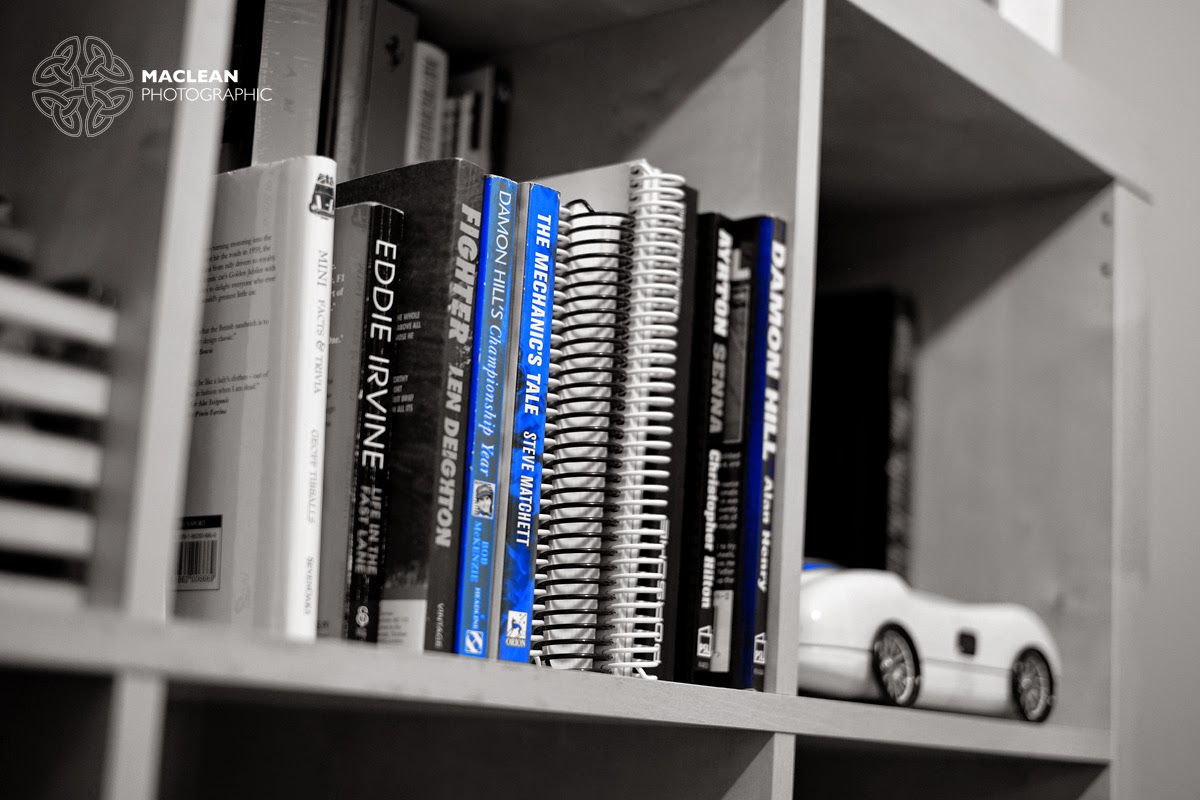REVIEW: X-T1 Advance Modes - Partial Colour
 |
| Using Partial Colour Red I retained the colour in the Union Jack flying from the Royal Yacht Britannia |
The X-T1 has several ADV modes, selectable on the left hand command dial, including Partial Colour, where the X-T1 retains one selected original colour and changes the rest of the photo to black and white. The colours available are Red, Orange, Yellow, Green, Blue and Purple.
 |
| Using Partial Colour Yellow I retained the yellow Lichen on the rocks in this shot of Bass Rock |
While it isn't a hard job to produce a Partial Colour image from a full colour shot in Photoshop, the X-T1 makes it very easy to take a single colour image, especially if a scene has a dominant colour like the shots above.
The image below was taken during scrutineering for the FIA World Endurance Championship race in Texas and is another example of Partial Colour (Red) in use.
I carried out some further tests using the bookcase in my office, selecting blue, then green and then red. The multicoloured books and other objects gave me the opportunity to test out the camera's ability to spot the various colours without including others. I have to admit the results were very good.
 |
| Using Partial Colour Blue mode |
 |
| Using Partial Colour Green mode |
 |
| Using Partial Colour Red mode |
As reported on the previous blog from Lake Como, the ADV modes only record images in JPEG. I usually take images in JPEG (either B&W or VELVIA) and RAW so there is always a full unprocessed data version (a digital negative) of the images I take available. This isn't the case with ADV mode images so what you see is what you get.
Other X-T1 advance modes include -
Dynamic Tone
Creates a fantasy effect by altering the tonal reproduction of the scene.
High Key
Enhances brightness and reduces contrast to lighten tonal reproduction.
Low Key
Creates uniformly dark tones with emphasised highlights.
Soft Focus
Creates a look that is evenly soft throughout the whole image.
Pop colour
Emphasises contrast and colour saturation.
Toy Camera
Creates shaded borders as if you were taking a photo on a toy camera.
Miniature
Adds top and bottom blur for a diorama or miniature effect.
I will be reporting on other ADV modes on the X-T1 in future blogs
The next scheduled update will be on Wednesday 24 September.




why on earth would you want to do this? it's horrible.
ReplyDeleteIan - photography, like all forms of art, is subjective. What one person likes something you will always find someone else with the opposite opinion. You think partial colour / colour pop is horrible, and I support your right to express your opinion (hence why I have published your comment). I like partial colour images as long as the subject is strong enough (which I will admit is not very often). The purpose of this blog is to inform the reader of some of the functions of the cameras and lens I use for my work. I will freely admit that some of the functions will never see the light of day, but that would be the same for any camera that I was using, I have my way of working, which may or may not suit another photographer. It is up to the reader to decide.
ReplyDeleteThank you for taking the time to read my blog, it is appreciated, and I hope you will find some other items on here that you will approve of. Jeff